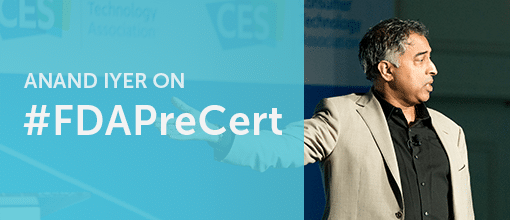In mid-2017, the U.S. Food and Drug Administration (FDA) published the Digital Health Innovation Action Plan. At the same time FDA’s current Commissioner, Scott Gottleib, MD, launched the Software Precertification Pilot Program, simply called Pre-Certification or Pre-Cert program.
Uniqueness’s of Digital Health Technologies
This program, developed under FDA’s Center for Center for Devices and Radiological Health (CDRH), recognizes the uniqueness’s of digital health technologies, in their promise to improve the health of the public and the frequent iterative process of product improvements. A key aim of Pre-Cert is to assure delivery and access to high-quality, safe and effective digital health products in a timelier and less burdensome process.
FDA’s Steps to Create Pre-Cert
To create Pre-Cert, FDA is conducting a pilot with nine companies (link: https://www.fda.gov/NewsEvents/Newsroom/PressAnnouncements/ucm577480.htm). The pilot, considered a first step in this process, is designed to collaborate with the full ecosystem of stakeholders to achieve success. Phase 1 included site visits to the pilot organizations. Phase 2 was a public workshop, Fostering Digital Health Innovation: Developing the Software Precertification Program, held January 30-31, 2018.
Public Workshop on Pre-Cert
This public workshop delved into the program’s progress and sought input from the nine pilot players on their visions for the Pre-Cert program. To be clear, these nine entities were not chosen by FDA as the first to obtain Pre-Cert status, rather they’re helping to design the process FDA will put in place. Complete archives of the workshop are available (link: https://www.fda.gov/MedicalDevices/NewsEvents/WorkshopsConferences/ucm587581.htm?utm_content=buffere281c&utm_medium=social&utm_source=twitter.com&utm_campaign=buffer).
Top Take Aways from Anand Iyer
Anand Iyer, PhD, MBA, WellDoc’s Chief Strategy Officer, presented at and attended this workshop. He has been involved long term in the thinking behind this innovative FDA program. He shares his top line take aways here:
- The FDA aspires to decrease the approval process cycle time to clear certain low, and perhaps low-medium risk Software as a Medical Device products (SaMD). So rather than FDA clearing every product or iteration of a product for which the entity seeks FDA approval there would be a process to clear the digital health developers/companies. To accomplish this, FDA must develop a framework that includes a process, a key performance indicator (KPI) scorecard and a mechanism for the entity to earn initial approval and maintain their status over time.
- An element of this process requires the development of transparent metrics. The five areas of transparency FDA is looking at are: patient safety, clinical responsibility, product quality, cyber responsibility and proactive culture. For each of these metrics, FDA is seeking to understand best practices and industry-accepted KPIs used to measure excellence.
- Building this Pre-Cert process is a disruptive move by a government regulatory agency (FDA in this case). It fundamentally changes the rules of the game. But, it’s a “have your cake and eat it too” play on the part of FDA. It allows technology innovation to flourish at higher speeds while maintaining safety and quality as non-negotiable “pins in the sandbox.”
- By observing the list of the nine companies chosen by FDA to participant in this pilot, it’s clear an objective is to take inputs from entities who’ve been involved in the device space a long time (e.g., JNJ, Medtronic) as well as to also learn from emergent players (e.g., Apple, Google, Samsung) to arrive at a unified program.
- In addition to attendance by members of the nine pilot entities, FDA very smartly also invited several standards and quality organizations, such as the European Quality Association, the U.S.-based Center for Medicare and Medicaid Innovation (CMMI), Balanced Scorecard and others.
- Significant work remains to synthesize the learnings from the workshop to achieve the end goals of this program. Reality is this type of program has never existed. It’s not just a cut and paste from someone or something else. It has unique characteristics and constraints.
Follow the evolution of this novel program on Twitter at: #FDAPreCert
Check out the top line take aways from this public workshop from digital health clinician and researcher, Malinda Peeples, RN, MS, CDE, WellDoc’s VP, Clinical Services, Programs and Research.





